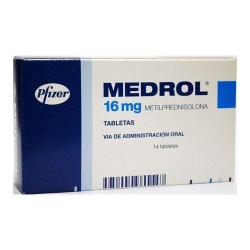Medrol (methylprednisolone) Coupons, Discounts & Cost
Medrol (methylprednisolone) is a drug from the group of synthetic corticosteroids. One way to save money on the Medrol retail cost regardless of income and insurance status is to use Medrol coupons or discount cards from RXCoupons. Use this Methylprednisolone coupon at this online pharmacy and receive up to 75% off the sale price.
What do I need to know about Medrol (methylprednisolone)?
Medrol (methylprednisolone) is a drug from the group of synthetic corticosteroids (adrenocortical hormones) used in the treatment of many diseases, including those of the spinal column.
Indications for use:
- Aspiration pneumonia, symptomatic sarcoidosis, certain forms of pulmonary tuberculosis (as a part of TB therapy), Loeffler's syndrome, berylliosis;
- Combination therapy of tuberculous meningitis in patients with subarachnoid block;
- Endocrine pathology: congenital adrenal hyperplasia, primary and secondary adrenal insufficiency, subacute and chronic thyroiditis, hypercalcemia;
- Idiopathic thrombocytopenic purpura and secondary thrombocytopenia (in adults), autoimmune hemolytic anemia, congenital aplastic anemia, pure red cell anemia;
- Treatment of connective tissue disorders in rheumatic heart disease, systemic dermatomyositis (polymyositis), systemic lupus erythematosus, polymyalgia rheumatica, giant cell arteritis (as maintenance therapy in some cases);
- Skin diseases: pemphigus, severe erythema multiforme (Stevens-Johnson syndrome), mycosis fungoides, exfoliative dermatitis, severe seborrheic dermatitis, severe psoriasis;
- Additional (short-term) treatment of the diseases of the musculoskeletal system, including rheumatic diseases: acute forms of psoriatic arthritis, rheumatoid arthritis (including juvenile rheumatoid arthritis), ankylosing spondylitis, bursitis, non-specific tenosynovitis, gouty arthritis, post-traumatic osteoarthritis, epicondylitis;
- Treatment of severe forms of seasonal or perennial allergic rhinitis, hypersensitivity reactions to medicines, serum sickness, contact dermatitis, atopic dermatitis, bronchial asthma;
- Chronic and acute inflammatory and allergic processes associated with diseases of the eye: keratitis, optic neuritis, iritis and iridocyclitis, allergic corneal marginal ulcers, allergic conjunctivitis, sympathetic ophthalmia;
- Palliative therapy for cancer patients: leukemia and lymphoma in adults, acute leukemia in children;
- Acute forms of ulcerative colitis and regional enteritis;
- Neurological lesions in trichinosis;
- Brain edema with brain tumors, exacerbation of multiple sclerosis;
- Combined therapy in organ transplantation.
Precautions for Medrol administration
Do not take this drug in the following cases:
- Period of breastfeeding;
- Hypersensitivity to the drug.
Precautions: patients with esophagitis, gastric ulcer and duodenal ulcer, gastritis, intestinal anastomosis, latent or acute peptic ulcer, diverticulitis, ulcerative colitis, hyperlipidemia, diabetes, osteoporosis, myasthenia gravis, hypothyroidism, hyperthyroidism, acute psychosis, subacute and acute myocardial infarction, hypertension, congestive heart failure, hypoalbuminemia, open-angle glaucoma, herpes simplex eye infection, HIV (AIDS), measles, chicken pox.
Medrol can be used in latent and active tuberculosis, as well as in severe forms of viral or bacterial infections only as part of a specific therapy. It is not recommended for the treatment of systemic fungal infections. The therapy is acceptable during pregnancy only if absolutely indicated.
Medrol dosage
The dosage regimen is prescribed by the physician (depending on clinical indications and patients’ response to therapy).
Recommended daily dosage:
Adults: initial dose - 4-48 mg, depending on the nature of the disease and the patient's condition. Multiple sclerosis - 200 mg, brain edema - 200-1000 mg, organ transplants - up to 7 mg per 1 kg of body weight per day. Medrol should be replaced by other drug in the absence of therapeutic effect.
Children: the dose is set depending on the total body surface area or weight of the child.
The daily dose should be gradually decreased in long-term treatment (choose the lowest maintenance dose).
What are the side effects for Medrol?
Digestive system: gastrointestinal bleeding, peptic ulcer, pancreatitis, esophagitis.
Metabolism: chronic heart failure in susceptible patients, high blood pressure, hypokalemic alkalosis, fluid retention.
Endocrine system: Cushing's syndrome, hirsutism, hypothalamic-pituitary-adrenal axis suppression, decreased carbohydrate tolerance, menstrual irregularities, growth retardation (in children).
Musculoskeletal system: muscle weakness, steroid myopathy, osteoporosis, tendon rupture, pathological fractures.
Nervous system: increased intracranial pressure, psychiatric disorders, convulsions.
Allergic reactions: hypersensitivity reactions.
Dermatological reactions: petechiae and ecchymosis, thinning of the skin.
Other reactions: opportunistic infections.
General precautions
Medrol should be used in the lowest doses (high risk of complications during glucocorticoid therapy). The drug may potentiate the development of mental disorders, including insomnia, euphoria, depression, acute psychotic symptoms, or emotional instability. Patients prone to psychotic reactions should increase the dose of the drug.
Caution should be used in the treatment of herpes simplex eye infection because of the risk of corneal perforation. Long-term therapy may lead to secondary ophthalmic viral or fungal infection, allergic reactions, glaucoma, etc. High doses of methylprednisolone can cause high blood pressure. Medrol increases calcium excretion.
Medrol should be used in combination with other medicinal products only after consultation with a doctor.

